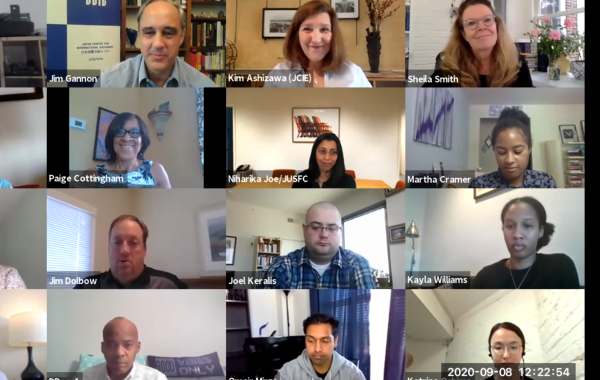China-Japan-US Research and Dialogue Project

Based on the premise that the security and prosperity of Asia Pacific is largely contingent upon cooperation among China, Japan, and the United States, JCIE launched a long-term policy research and dialogue project to explore the challenges that lie ahead. The project combines workshops involving experts with study groups of emerging intellectual leaders from the three countries.
Domestic Adjustments in the Face of Globalization

Under the guidance of Dr. Charles Morrison of the APEC Study Center, Hawaii, and Dr. M. Hadi Soesastro of the Centre for Strategic and International Studies, Jakarta, a multilateral team of 11 scholars identified and explored the policy issues created or substantially affected by the effects of globalization on their respective countries and regions. The results of the survey were published in 1998.
Development of Trilateral Cooperation in Global Governance among East Asia, North America, and Europe

Beginning in 2006, this APAP research program focused on the question of the “Development of Trilateral Cooperation among East Asia, North America, and Europe” and how the creation of a functional trilateral structure might be created to foster the stable development of global governance. As a result of the project, East Asia at a Crossroads was published in 2008.
Engaging the United States in an Emerging East Asia Community

In cooperation with the United States Asia Pacific Council, JCIE launched a joint study and dialogue in 2004 that explores Asian actors’ incentives, goals, and visions of regional community; potential US reactions; and ways of guiding community-building efforts so that they meet the interests of all parties by enhancing stability and prosperity in the region.
Japan 101 Online Course: Understanding US-Japan Relations

An online course for Congressional staff to bring them up-to-date on the US-Japan relationship and its importance in the US’s approach to Asia.
Global ThinkNet Fellows | The Japan-US Alliance: New Challenges in the 21st Century

A group of six young scholars examined the elements that might affect the Japan-US alliance in coming decades, including domestic public opinion and politics, tensions between other countries, and cultural outlook. Their final papers were published by JCIE as an edited volume, Japan-US Alliance: New Challenges for the 21st Century.
Force, Order, and Global Governance: US, German, and Japan Perspectives

In 1999, JCIE and the Brookings Institution launched a project to help guide the process of consensus-building by examining the key areas of contention in greater depth from the perspectives of the United States, Germany, and Japan.
Governance for a New Century: Japanese Challenges, American Experience

In 1998, JCIE and the Brookings Institution launched a comparative study of the patterns of governance in Japan and the United States based on the premise that they face many similar challenges in this arena. The final papers from this project were published in English in May 2002.
Guidance for Governance: Comparing Alternative Sources of Public Policy Advice

Beginning in 1999, JCIE and the Brookings Institution initiated a comparative assessment of the state of alternative sources of policy advice in eight democratic countries. Drafts of the papers were presented and discussed at a workshop held in Tokyo on May 28, 2000, as well as during one of the sessions at the Global ThinkNet Conference, held in May 2000.
Japan-United States Economic Relations Group (Wisemen’s Group)

This group of eight leading private citizens was charged with the task of examining the factors affecting long-term bilateral economic relations between the United States and Japan. JCIE was asked to serve as the Japanese secretariat, with JCIE Director Tadashi Yamamoto as an executive director of the group.
